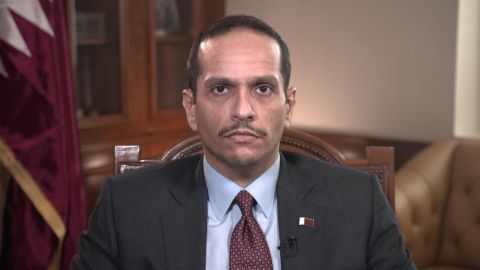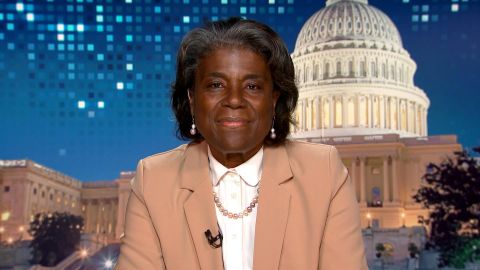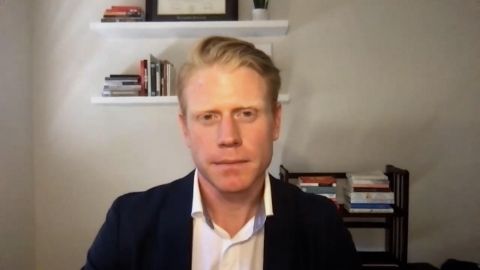Read Transcript EXPAND
CHRISTIANE AMANPOUR: Even before this terrible catastrophe, the accidental killing of Afghan civilians by American air power dogged the 20-year mission there and turned many people against it. And now, the White House backs an investigation into the latest such calamity that killed 10 civilians in Kabul last month, initially the U.S. claiming they had ISIS-K terrorists in their sight. Now, as a marine infantry officer, Ian Cameron, oversaw air strike which killed more than 300 Taliban fighters. Now, he wonders, did it even help? Here he is telling Hari Sreenivasan he thinks must be learned from America’s failed war there.
(BEGIN VIDEO CLIP)
HARI SREENIVASAN: Christiane, thanks. Ian Cameron, thank you for joining us. Now, you were a marine infantry officer and one of your roles was assisting in the targeting of Taliban on the ground in Afghanistan. You did this basically like a 9 to 5 job as you wrote in your recent op-ed. Tell me what an average day is like for you working in this unit that targets people with fighter pilots or with fighter planes or with drones?
IAN CAMERON, FORMER U.S. MARINE CORPS INFANTRY OFFICER: An average day for me, it’s one of the — in some respects, one of the most boring nine months of my life and in some respects, some of the highest intensity nine months of my life. You know, every day, wake up. You know, a military base, an American military base in a combat zone in the 21st century, can often be a somewhat comfortable place which is another strange part and something I didn’t anticipate. I had my own room. Woke up. I went and ate, you know, eggs to order cooked by Indian contactors in the mess hall, walked across the street to this air-conditioned room where I brew a cup of – a pot of coffee and sat down and did my shift for eight hours in which I killed men every single day. Finished that shift on schedule every day at 4:00 p.m., turned it over to my counterpart, I go work out in the gym, take a hot shower, Wi-Fi connectivity allowed me to call my girlfriend in the States. I’d read a book. You go to bed. So, the juxtaposition between a comfortable, very regular existence on an American military base in the 21st century and the very violence operation we’re conducting within that eight-hour shift is definitely something that I wanted to share with folks in this article that I wrote and something that I think will continue to see moving forward if continue with remote targeting as a way in which we carry off foreign policy objectives.
SREENIVASAN: Did that seem strange to you that this was going to war on schedule?
CAMERON: It definitely was a strange experience and one that was very different from the one that I prepared for. Growing up, I attended naval academy as an 18-year-old and in the early and late 2000s, watching the images of the war, that’s what I anticipated my experience would be like as an infantry officer in a combat zone. It turned out it was very different. But I believe that it’s emblematic of many service members’ experiences in Afghanistan and will continue to be so in future conflicts moving forward.
SREENIVASAN: So, give me an idea. Most people have never seen what you’ve seen inside the room. The perspective of a drone. How — what’s the level of detail that you can see on the ground from something that’s so far up in the sky?
CAMERON: It really kind of depends on the particular system that we’re using. But it’s detailed enough that there’s definitely a contrast between — there’s a very systemic way in which we track targets in a combat zone. But the drone and the images coming from the drone often paints a pretty intimate portrait of that person’s daily activity. And as you follow around a target, gathering additional intelligence, you’ll kind of become apart, you’ll be sucked into, you know, his daily life and his daily routine. And so, it’s enough to give a sense of — a little bit of sense of the daily life of that person and that target that you intend to kill.
SREENIVASAN: Now, you wrote that you could even see the sequins on a baseball cap or cap, I mean, at that level from so far up?
CAMERON: In that particular strike, yes. And there’s enough granularity to be able — it’s important, especially in an environment in which the Taliban, in this case, are blending in with the local population to be very precise and very, very discerning on tracking individual target. And so, there are many different cameras typically involved and there’s many people watching that and keeping track and correlating the intelligence available to us with that particular target is of utmost importance and something that we spend hours every day doing to make sure that the targets that we were — and the people we were killing matched up with the incredible intelligence that we had.
SREENIVASAN: Do you remember how many targets you had acquired? How many people it was in the time that you were there?
CAMERON: 305 Taliban killed during the time — during my shift, and that’s just because we kept very detailed accounting of what we thought happened to create the best picture that we could of the effects that we were having in that battle scenes. And what that meant on an operation basis (INAUDIBLE) conducting about a strike or two every single day.
SREENIVASAN: What does that do to you and the group of people you’re working with? I know that you were not operating the drone. You were assisting in this whole process. But if you’re watching someone all day and you can look at them close enough to see the sequins of their hat or see what they’re doing, and you are authorizing their life to be extinguished, I mean, how do you clock out of that and go back to, you know, eating dinner at the mess hall and do it again the next day?
CAMERON: For me personally, Hari, and I can’t speak for the personal experiences of hundreds and thousands of other service members who have had similar experiences. But for me, personally, there was definitely an in the moment, an ability to look at it, you know, very clinical, almost surgical perspective and conduct my assigned mission and job to the best of my ability. Nevertheless, the portrait that a drone in the 21st century paints of facts on the grounds, those are real and those are something that you see every day. So, I can tell you that that’s something that I was able to compartmentalize while I was conducting that job, but definitely something that I struggle with today and I can’t speak for the thousands of other service members who have been in similar roles, but I imagine that they might feel similarly.
SREENIVASAN: Do you carry this with you after you leave? I mean, is this something you speak to a psychologist or a therapist about? Do you have any semblance of PTSD?
CAMERON: It’s definitely something I carry with me, Hari. I want to be clear that I’m proud of my service and I’m proud of the service of all of the marines that I worked with, and I think we carried out our jobs to the best of our abilities. I think that the consequences of this war in Afghanistan is something I carry with me but I think that’s something all Americans need to reckon with, and it’s not just the service members who went to Afghanistan but it’s the voters who voted for our elected officials who chose to go to the war in — who chose to prosecute a war in Afghanistan and who chose to continue that war. And I think the lesson moving forward is that just because we’re able to remove ourselves from the battlefield by a technology does not diminish our responsibility to engage in the conflict as a political body from both a moral and a political perspective.
SREENIVASAN: Tell us your reaction when you first learned and you watched the Pentagon say that we had killed an Islamic State extremist and then, it turns out — it was a tragic mistake. It killed 10 people, including an employee at a humanitarian organization and as many as seven children.
CAMERON: I think my first reaction was relief. You remember, just, you know, two days before, there was a horrific attack at the Kabul Airport resulting in 13 — the deaths of 13 U.S. service members and dozens, in fact hundreds of Afghan civilians. And there were very creditable reports coming in about an imminent suicide bomb attack at the airport again. And so, you know, when I first read about the strike and the first reports that, you know, they have hit their intended target, I was relieved. And then subsequently, we learned that, in fact, it was a tragic failure of intelligence and the target was executed — was prosecuted. And so, that was — I mean, I — that emotional arc from, you know, triumph and relief to preventing a suicide attack to the heart wrenching reality of civilian casualties, you know, that emotional arc definitely — that resonated with me and especially because I had been in a very similar seat before.
SREENIVASAN: You’ve been in the room where it happens, so to speak, so many times and so many different missions. What happens when there is collateral damage, when there’s an investigation? What are the people in the room feeling when you find out that perhaps there’s an innocent bystander or a child involved?
CAMERON: I think what’s important to note is that precision targeting is anything but precise. There’s incredible technology that allows the United States to put ordinance in very specific places. But at the end of the day, it’s the intelligence behind it that is never precise. And there is exhausted procedures that we go through to vet our intelligence to make sure that the target that we’re intending to shoot is our intended target. And I can’t speak to this particular scenario, but I can imagine the pressure, especially given the intelligence reports and the events of the couple previous days with the suicide attack at the airport. Nevertheless, there’s a process that followed. I have confidence that process was followed in this regard. If it wasn’t, I’m sure an investigation will turn that up and I encourage the Pentagon to fully investigate this, as we have throughout this point of your (ph) conflict and as I’ve experienced as well. When precise targeting becomes imprecise, we take a very hard look at what went wrong and why, and what we can do to prevent it in the future.
SREENIVASAN: You know, I can hear someone in the audience saying right now, think about all of U.S. service members, military lives that have been saved by the fact that we didn’t have to be in harm’s way.
CAMERON: That’s right. And I think that that is, you know, something that this technology has allowed us — has blocked too (ph) conflicts and has allowed the United States to prosecute its foreign policy objectives with less direct risk to U.S. service members. And that’s a good thing, Hari. But what we can’t abdicate is our moral responsibility for the consequences of those actions. Just because the United States service members are no longer or are in less direct danger when conducting remote targeting, doesn’t mean that the effects of that remote targeting has devastating and lethal consequences. And our responsibility to — for those consequences has not diminished.
SREENIVASAN: I want to touch on something you mentioned earlier, which is kind of this level of detachment that remote targeting allows us and the fact that, you said, hey, you know what, we’ve paid a ton of attention as the withdrawal happened and we paid a ton of attention right after 9/11. But there was a pretty big gab in between where we weren’t paying nearly as much attention. And how much of that is because we have this technology now and this isn’t a war that was — you know, we were drafted into service, it didn’t cut across all socioeconomic backgrounds equally, right? We are seeing that there is a technology and potential for us to keep soldiers out of harm’s way, perhaps here in Nevada and be drone pilots for something that’s happening way over there.
CAMERON: Yes. Hari, the — I was 11 years old — nine-year-old. I — you know, my formative (ph) years growing up saw some of the highest intensity conflicts in Iraq and Afghanistan, and I watched that on television. When I ended up deploying to Afghanistan in 2018, the Afghanistan war was still happening. But when I told one of my friends who I hadn’t seen in a long time that, you know, I was going to be doing that for nine months, they said, oh, we’re still in Afghanistan? And now, while, you know, that fact might not have been lost on most Americans, the level of attention that the United States paid to the Afghanistan conflict was minimal compared to many previous conflicts that we’ve had in our history. You know, when was Afghanistan a major election issue at any point in that 20-year conflict? I can’t remember that being a make-or-break issue for any presidential candidate or any congressional candidate or any Senate candidate. And I think that speaks to the effects that this remote targeting has had on how we think about these engagements. Nevertheless, the consequences are still real from a moral perspective and from a political perspective. And the fact that Americans are less in the line of fire does not reduce our responsibility to engage critically with the immense power that we yield as a nation.
SREENIVASAN: I don’t know if this is too overarching a question, but depending on why you enlisted, was it worth it?
CAMERON: It was worth it, Hari, and I would do it again and I would encourage those that I care about to join the U.S. military. And what I think is important, Hari, is that we have people who care about the mission and who are willing to serve our country. And I’m glad that I had the opportunity to do so. What I hope that we learn from this conflict in Afghanistan is our need to continually engage with the conflicts that we choose to send young men and women to fight. And I think that there might have been points in the 20- year very long conflict that we lost sight of that. That’s what I hope we take moving forward and I hope that there will continue to be conscientious young men and women willing to serve their country where their country calls them to serve.
SREENIVASAN: Ian Cameron, former marine and infantry officer. Thanks so much for joining us.
CAMERON: Thank you, Hari.
About This Episode EXPAND
Ambassador Linda Thomas-Greenfield discusses this week’s UN General Assembly. Sheikh Mohammed bin Abdulrahman Al-Thani, Qatar’s foreign minister, discusses his country’s role in the situation in Afghanistan. Former U.S. Marine Corps Infantry Officer Ian Cameron explains the lessons he thinks must be learned from America’s failed war in Afghanistan.
LEARN MORE


